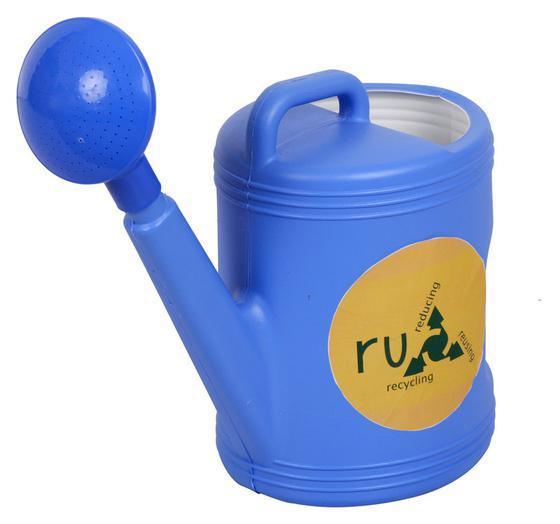WATERING CAN (COST: RS.450/PIECE)
₹450.0
Plastic watering can with 5 ltr capacity
Used to collect leachate from RGGC composting
system and spray diluted leachate for plants
Color may vary
Durable Watering Can Rs.450:
Embracing eco-friendly products transforms waste into wealth, fostering sustainability and mitigating environmental impact. Innovative initiatives champion the conversion of discarded materials into valuable resources, paving the way for a circular economy.
To commence this virtuous cycle, recycling emerges as a key player. Plastics, paper, and metals, once destined for landfills, undergo a metamorphosis. These materials are reimagined, reincarnated into new products, reducing the demand for virgin resources and curbing pollution.
Biodegradable alternatives further revolutionize our consumption patterns. Products derived from natural materials seamlessly integrate into the ecosystem, leaving minimal traces. This shift not only reduces the burden on landfill sites but also curtails the persistence of harmful substances in the environment.
In the realm of waste-to-wealth, upcycling emerges as a creative force. Discarded items find a second life, elevated into functional and aesthetically pleasing artifacts. From repurposed furniture to fashionable accessories, upcycling not only minimizes waste but also showcases the beauty of sustainable design.
In the business landscape, companies increasingly adopt a cradle-to-cradle approach. This entails designing products with their end-of-life in mind, ensuring that materials can be easily disassembled and reused. Such practices not only enhance resource efficiency but also cultivate a mindset of responsibility within the industry.
Durable Watering Can Rs.450: The waste-to-wealth paradigm extends beyond tangible goods to energy production. Biomass, a byproduct of organic waste, becomes a valuable energy source through anaerobic digestion or incineration, contributing to the renewable energy matrix.
In conclusion, the transition to eco-friendly products and the waste-to-wealth philosophy signifies a revolutionary stride towards a sustainable future. By reimagining waste as a valuable resource, society not only mitigates environmental harm but also forges a path toward a regenerative and harmonious relationship with the planet.
You must be logged in to post a review.
Q & A
1. Materials
a. Recycled or Upcycled Materials:
- Recycled Plastics: Using post-consumer recycled plastics (e.g., rPET) significantly lowers the carbon footprint. According to Plastics Europe, recycling PET can reduce CO2 emissions by up to 60% compared to using virgin PET.
- Upcycled Materials: Products made from upcycled materials, which reuse waste or scrap materials, reduce the need for new raw materials and minimize waste.
b. Eco-friendly Materials:
- Bioplastics: Made from renewable resources like corn starch or sugarcane, bioplastics can lower the carbon footprint compared to conventional plastics. The European Bioplastics organization highlights that bioplastics can contribute to a lower carbon footprint and reduced dependency on fossil fuels.
- Sustainable Metals: If the watering can is made from metals like aluminum or stainless steel, using sustainably sourced metal and implementing recycling processes can also reduce its environmental impact. The International Aluminum Institute notes that recycling aluminum saves 95% of the energy required to produce new aluminum.
2. Manufacturing Process
a. Energy Efficiency:
- Renewable Energy: Manufacturing facilities that use renewable energy sources (solar, wind, hydro) have a lower carbon footprint. According to the World Resources Institute, shifting to renewable energy can cut greenhouse gas emissions significantly.
- Energy-efficient Production: Processes that use less energy or waste less energy reduce the overall carbon footprint. The Carbon Trust provides guidelines on energy-efficient practices that can help companies reduce their emissions.
b. Minimizing Waste:
- Lean Manufacturing: Employing lean manufacturing principles to minimize waste and improve efficiency can also reduce the carbon footprint. The Lean Enterprise Institute offers resources on how lean practices can lower environmental impacts.
3. Design and Durability
a. Longevity and Quality:
- Durability: A watering can designed to last many years reduces the need for replacements, which in turn lowers its overall environmental impact. The Ellen MacArthur Foundation reports that product durability can significantly reduce resource consumption and waste.
- Repairability: Products designed to be easily repaired extend their lifespan and reduce the need for new products, contributing to sustainability.
b. Efficient Design:
- Minimal Material Use: A design that uses fewer materials while maintaining functionality can reduce the carbon footprint. For instance, a streamlined design that eliminates unnecessary components lowers material usage and waste.
4. End-of-Life Management
a. Recyclability:
- Design for Recycling: Designing the watering can to be easily disassembled and recycled at the end of its life ensures that it can be properly processed and reused. The Recycling Partnership emphasizes the importance of designing products with end-of-life recycling in mind.
b. Biodegradability:
- Biodegradable Materials: For watering cans made from biodegradable materials, decomposition occurs naturally, reducing landfill waste. Research from The Biodegradable Products Institute shows that biodegradable plastics can help reduce the environmental impact of waste.
Additional References:
- Plastics Europe: “The Benefits of Recycling Plastics” - Plastics Europe.
- European Bioplastics: “Bioplastics: Benefits and Potential” - European Bioplastics.
- International Aluminum Institute: “Sustainable Aluminum” - International Aluminum Institute.
- The Ellen MacArthur Foundation: “Circular Economy and Product Longevity” - Ellen MacArthur Foundation.
General Inquiries
There are no inquiries yet.



Reviews
There are no reviews yet.